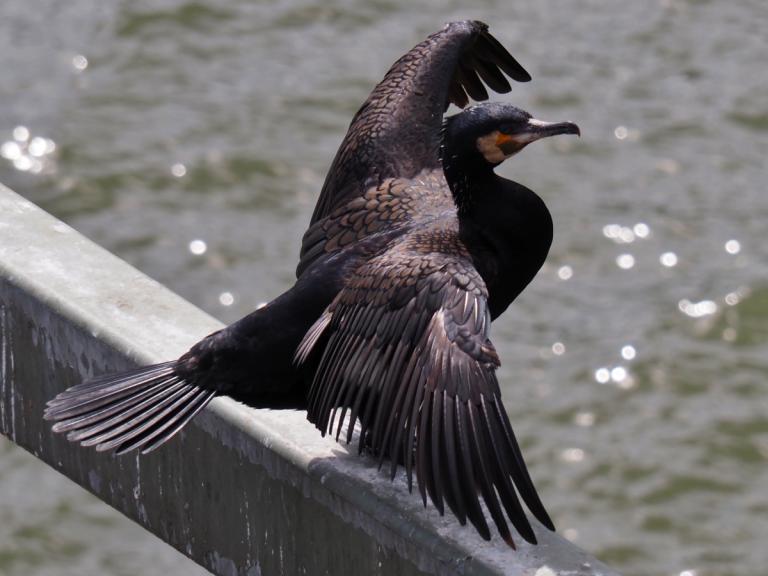We see it on a regular basis.
Something bad happens, something terrible, something tragic. Homes are destroyed, lives are disrupted, people are killed. And then someone who came through it unscathed – or even just still alive – says “God was looking out for me.”
And then someone else – usually an anti-theist, but not always – says “why did God look after you but not after the people who were killed?”
A few years ago a tornado completely leveled a church somewhere near here. Fortunately – thankfully – no one was in the church at the time. On the next Sunday the congregation gathered in the rubble and the preacher said “we praise God that no one was injured.”
In all seriousness, I admire their resilience. But this particular form of Christianity believes that their God controls everything that happens in the universe. Why were they praising him for their personal safety and not cursing him – or at least, questioning him – for destroying their church, and the homes of others?
This became very personal this week.
The curious timing of a water leak
I recently had a water leak in my house. A copper pipe developed a pinhole leak and started spraying water inside the walls. The leak was tiny but any amount of water inside a wall is a bad thing, and over time a little water becomes a lot.
A plumber replaced the pipe a couple weeks ago. After everything dried out the painters came to repair the damaged wall and the ceiling below it. I sent an e-mail to my boss and co-workers, letting them know I’d be working from home that day. I briefly explained what was going on and said “thankfully, it happened after we got home from vacation.”
I discovered the leak a few hours after it began and it was fixed the next day. What if the leak had started the day we left for our two-week vacation? A friend came by periodically to take care of our cat, but there’s no guarantee she would have gone in the part of the house where the leak occurred – it could have leaked for two weeks. Even if she had noticed it, managing the repairs would have been very difficult. She would have done it, because that’s the kind of person and friend she is. But it would have been disruptive for her, and it would have caused a huge amount of stress for me knowing there was a serious problem with my house and I wasn’t there to make sure it was fixed and fixed right.
I am thankful that the leak started when it did and not while we were gone.
But am I making the same mistake that preacher made?
No. And here’s why.
Life is far more random than we like to admit
Many years ago, I made a 180 mile trip in a snowstorm. I should have stayed home, but was 23 and I wasn’t going to let weather get in the way of my weekend plans. I almost made it. I was off the highway and about two miles from my friends’ house on a two lane road. There was a 90 degree left turn ahead and I slowed down a little more than usual. I thought that was enough. I was wrong.
The car lost traction, I slid off the road and headed for a tree. I tried to steer away from it but I was only partially successful. I dented the left front fender, knocked off the driver’s side mirror, and put a long scrape in the driver’s door.
These were the days before air bags – and before I wore seat belts on a regular basis. If I had been six inches to the left, I would have hit the tree head-on and would have died, or at least been seriously injured. If I had been six inches to the right, I would have missed the tree completely.
It’s been almost 40 years – I do not remember if I gave thanks, either to the Christian God or just in general. But I clearly remember being struck by the randomness of the situation.
There is so much in life that we do not and cannot control. When these things work out in our favor, we intuitively recognize we have received a gift we did not earn. And so we give thanks.
This is especially true when we’re presented with the stark contrast of a tragic event. Some are dead. We know we could be among them, but we aren’t. And so we give thanks.
Or we don’t. You may be glad you and your family got out of your burning house and still sad and angry that your home is gone. Telling someone “be happy – it could have been worse” is toxic positivity and a very harmful thing to do. I am not saying we must or should be thankful something bad wasn’t worse than it was.
But that’s another subject for another time. Our subject here is the people who are thankful – to their God or just in general – that things weren’t as bad as they could have been.
Gratitude is not enough
I bring this up almost every year at Thanksgiving. Gratitude is a wonderful and helpful spiritual practice. But gratitude alone is not enough.
Gratitude in isolation can focus too much attention on ourselves – we’re so busy giving thanks we made it through the tornado that we forget others did not. Our gratitude at Thanksgiving that we have enough is no substitute for making sure everyone has enough. We accomplish this through giving and teaching, but also through working to change systems that oppress and exploit the poor and the vulnerable. Gratitude must be balanced by a commitment to justice.
It’s not enough to be thankful we weren’t killed in a car wreck. We also need to work for safer cars, safer roads, safer drivers… and where possible, safer alternatives to cars (I think I have a blog post about American car culture in me, but it needs to marinate for a while longer).
Giving thanks that something bad wasn’t worse is a good thing, but it’s not enough.
The theology of “it could have been worse”
In the battle between chaos and order, I am firmly on the side of order. But even I recognize that chaos is a necessary thing. Chaos disrupts stagnation and creates opportunities. Those opportunities are not evenly distributed – they favor some and harm others. But because we live in a random universe, a small input in just the right place can have a tremendous impact. Because there is chaos, there is room for magic to work.
I expressed my thanks that the water leak happened when it did. But I was expressing thanks in general. I have no reason to think Cernunnos or the Morrigan or any of the other deities I follow intervened. Perhaps the local spirits – the spirits of this place and this house – did. Perhaps they plugged the leak until we got back. Or perhaps they saw a leak about to happen and pushed it along so that it happened now and not the next time we’re gone for a week or more.
Perhaps. But in the absence of any evidence or communication (UPG or otherwise) I believe this was a naturally occurring event whose random timing was favorable for me. It’s nothing personal – it’s not about me.
This approach works well for polytheists, for pantheists, and even for non-theists. But for monotheists – especially conservative monotheists, especially Calvinists – it presents a problem.
If you believe your God controls everything in the universe, then the cynic’s question of “why did God look after you and not after the people who were killed?” is a valid question that demands a valid answer.
Job, Calvin, and Lucifer
Many scholars consider Job to be the oldest book in the Bible. It’s a story that explores the eternal question of why bad things happen to good people. At the end, Job’s God says “where were you when I laid the Earth’s foundation?”
The storyteller is saying “we don’t know.”
If you read the Book of Job literally – as Calvinists do – then Job’s God is a monster. He kills innocent people and torments his loyal servant to win a bet. Instead of thanking your God that your child was cured of cancer, you should be cursing your God – or at least, severely questioning him – that childhood cancer even exists.
Thanking an all-powerful God that something bad wasn’t worse is like thanking an abusive parent for beating you a little instead of beating you a lot (there is never a valid reason for hitting kids – never).
As a polytheist, I believe there are many Gods, all of limited scope and power. I believe other people’s Gods exist, I just don’t believe they’re who and what they say they are. And so while I believe the God of Calvinism exists, I don’t think he’s the only God, or an all-powerful God.
But if I’m wrong and the God of Calvinism really is an all-powerful only God, if the Book of Job is history and not mythology, then the only ethical response is not obedience but rebellion. Lucifer was right.
But I don’t think I’m wrong.
And if the people who intuitively thank their God that things weren’t worse would think through this, they might come to a similar conclusion.
What it means to say “I’m thankful it wasn’t worse”
When I said I was thankful the water leak started after we got home from vacation, I recognized that this could have happened at any time. But for some reason – maybe spiritual intervention, probably random chance – it happened at a time that allowed me to minimize the damage.
It didn’t have to be this way. It certainly didn’t happen this way because of anything I did or didn’t do. It was a gift, and so I am truly thankful.
And I’m also annoyed it happened at all, but it’s a 30 year old house that’s been a good home for me for over 20 years. These things happen.
I don’t question my Gods as to why this happened. It’s outside their areas of interest. They could have intervened, but “nothing bad ever happens to my house no matter what” wasn’t part of our commitments to each other.
Many of us – Pagan or Christian or otherwise – intuitively give thanks when we come through something bad and realize it could have been worse. That intuition is correct.
And when we think about why it’s correct, we learn something valuable about the Gods, the Universe, and ourselves.
In response to a Facebook comment, I want to add that there are some polytheists – especially the Neoplatonists – who believe all Gods are all-powerful. I respect that view, but I don’t agree, both intellectually and from first-hand experience.


















